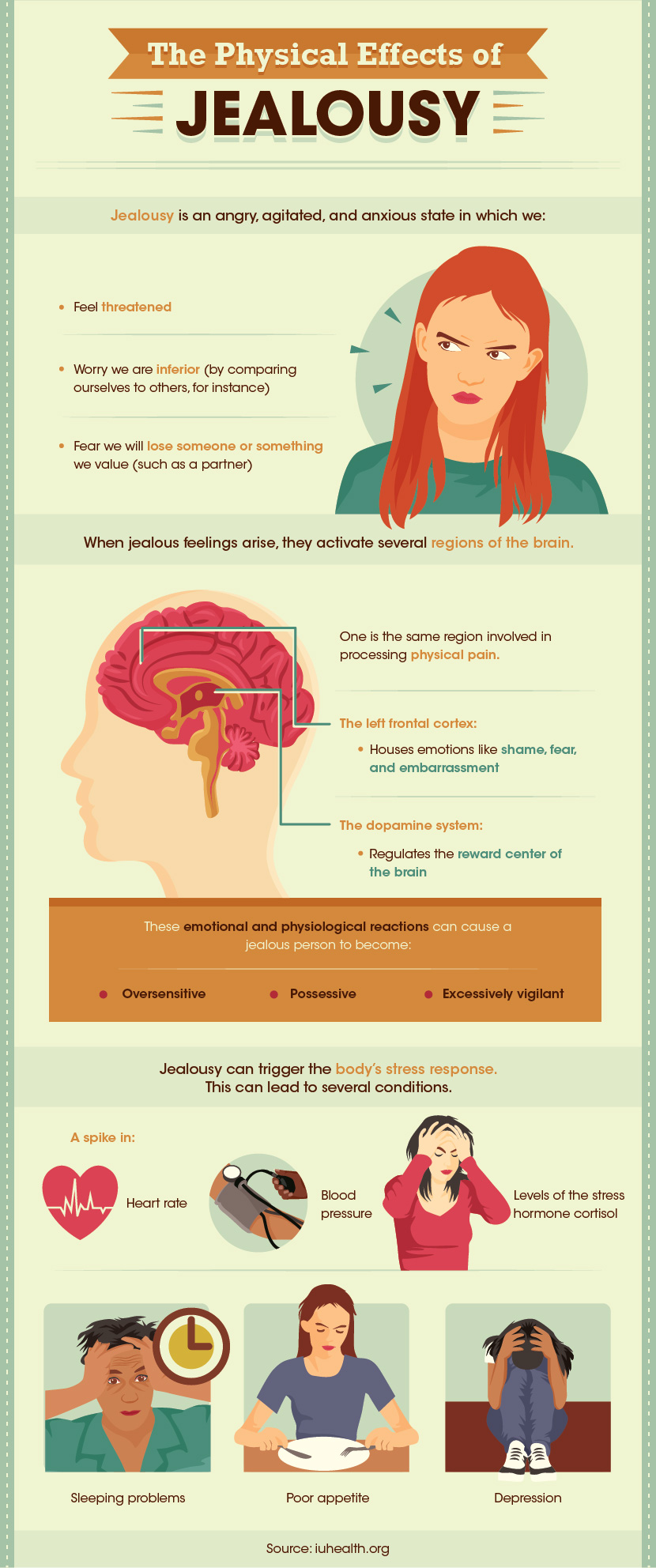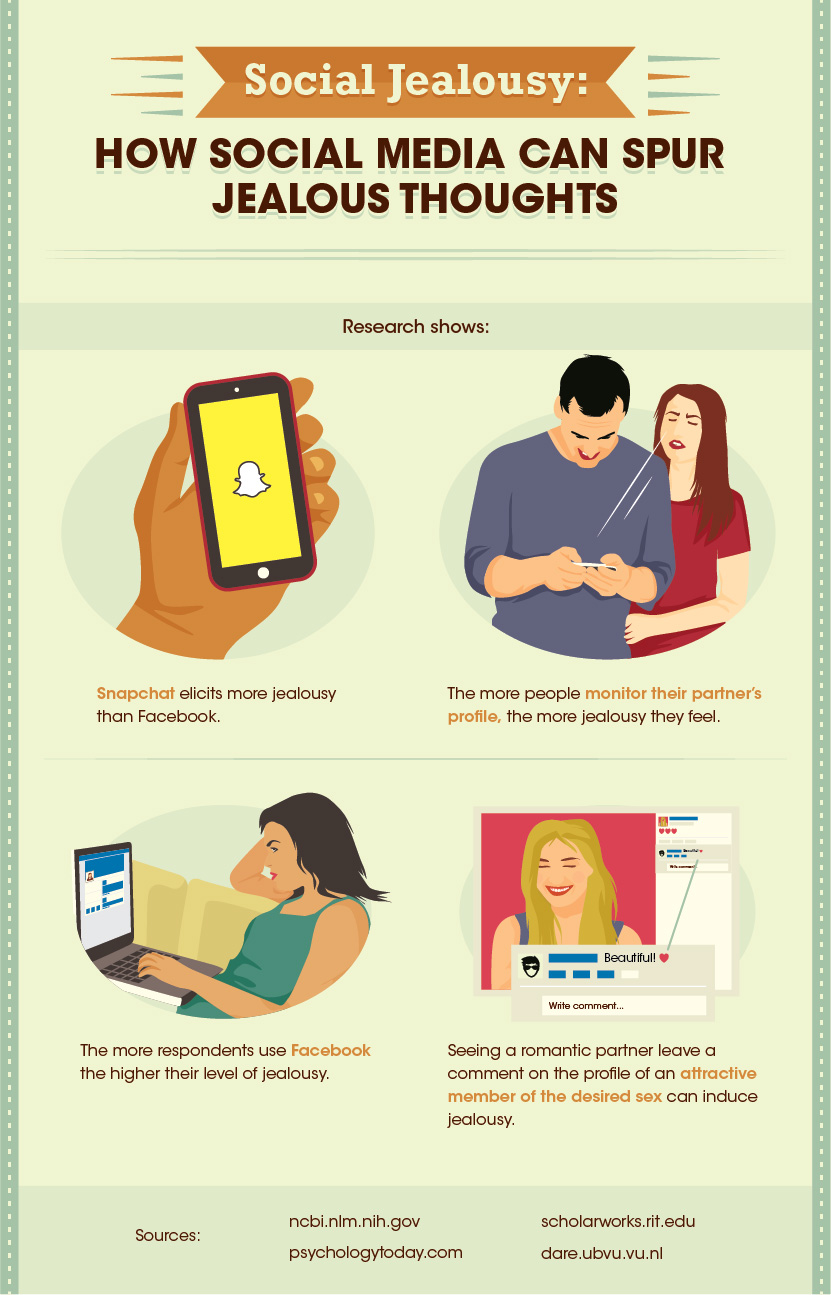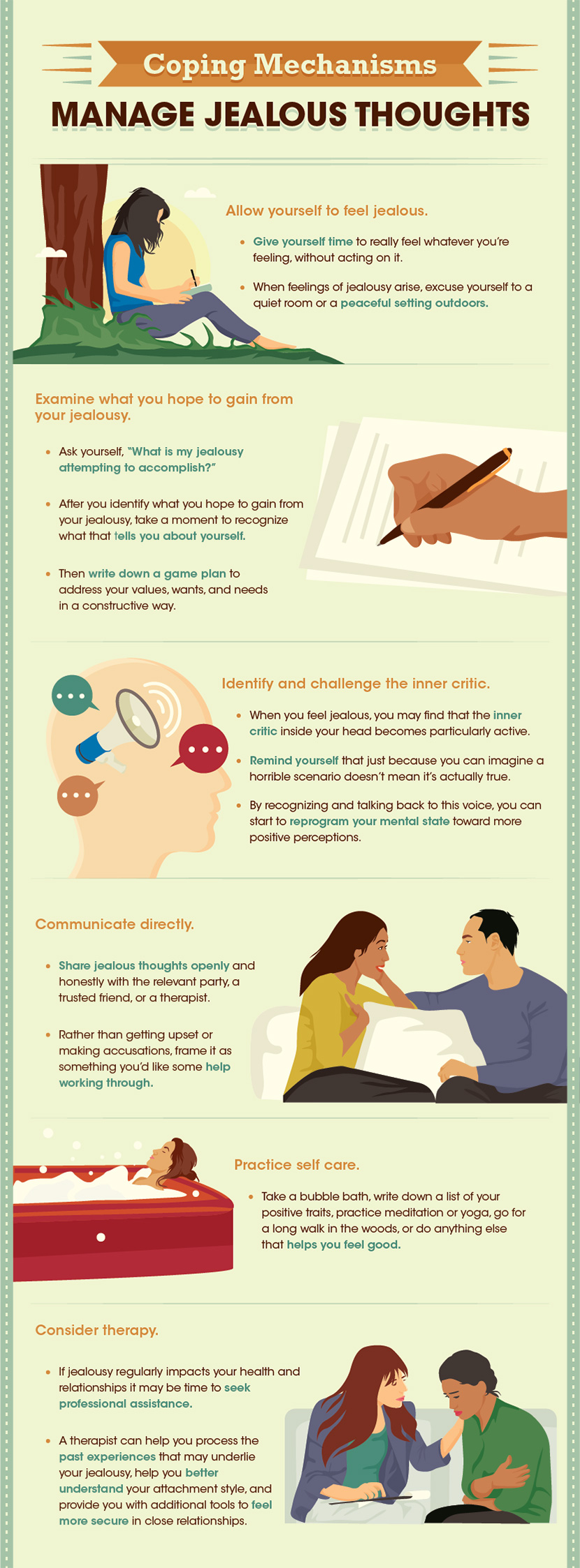The Science of Jealousy and How to Squash Jealous Feelings
If you’re a human who interacts with other humans, the odds are good that you know what it feels like to be jealous.
Jealousy is an angry, agitated, anxious state in which we feel
threatened. It can occur when we worry that we are inferior (by
comparing ourselves to others, for instance) or when we fear that we
will lose someone or something we value, such as a partner.
Jealousy can crop up in all types of relationships, including between siblings, friends, coworkers, and romantic partners.It can be similar to envy, which stems from resenting others who have
something you desire but don’t currently have, but ultimately, it has a
different cocktail of symptoms.
Psychologists believe jealousy may have evolved as a mechanism to
motivate us to maintain the relationships that contribute to our lives
and, by extension, our very survival. Small doses of jealousy can also clue us in to how much we value and appreciate the people in our lives. But while jealousy may be motivated by a positive outcome – like
sustaining a valued relationship – it can very easily lead to negative
consequences. Thanks to technological connectivity, it’s easier than
ever to come up with reasons to feel jealous these days.
The good news is that you don’t have to be a magician to cope with
jealousy. Instead, you can free yourself from the green-eyed monster’s
grasp with simple, do-anywhere techniques. Here’s how to recognize when
jealousy has reared its ugly head – and how to deal with it before it
harms your health and relationships.
This Is Your Body on Jealousy
Jealousy often manifests as feelings of anger, agitation, or intense
worry. Jealous feelings activate several regions of the brain. One is
the same region involved in processing physical pain; another also
handles emotions such as shame. These emotional and physiological reactions can cause a jealous person
to become oversensitive, possessive, or excessively vigilant.
Jealousy can also trigger the body’s stress response, leading to spikes
in heart rate, blood pressure, and levels of cortisol, which is the
stress hormone; it can also lead to sleeping problems or a poor
appetite.
In this way, jealousy’s effects are similar to those of chronic anxiety; it can even provoke depression.
When left unchecked, these jealous feelings can also turn into jealous
behaviors, such as leveling accusations, moping, seeking reassurance,
and lashing out.
Just as jealousy can have negative consequences on your personal
wellbeing, it can also harm your relationships. Jealous behaviors can
cause anyone, including siblings, coworkers, and friends, to distance
themselves from the person acting out of jealousy. For example, partners
accused of wrongdoing may feel
hurt, anxious, frustrated, or exhausted
from having to defend themselves.
Often, it’s not the person we’re jealous of that creates trouble in our
relationships – our own jealousy leads to inner pain, relationship
conflicts, misunderstandings, and, in the worst cases, permanent rifts.
How to Cope with Jealousy
We’ve established what jealousy is and how it can affect your body,
mind, health, and relationships. We’ve also recognized that when left to
its own devices, jealousy can be a toxic emotion that harms you and
destroys intimate relationships.
Now for the good news – while jealousy may feel overwhelming, you are
never at its mercy. It’s possible to identify and cope with jealousy in
healthy ways that leave your body, mind, and relationships intact.
Here’s how to identify and manage jealousy.
Allow yourself to feel jealous
Denial never helped anyone work through emotional challenges. Give
yourself time to really feel whatever you’re feeling without acting on
it. When feelings of jealousy arise, excuse yourself to a quiet room or a
peaceful setting outdoors. Breathe deeply and notice the emotions and
tensions arising in your body. Allow yourself to feel jealousy without
doing anything about it, and you’ll likely notice the feeling starting
to dissipate.
Examine what you hope to gain from your jealousy
Once you realize that you feel jealous and allow yourself to feel that
way for a bit, it’s time to start working with that emotion to respond
to it in a constructive way. A good place to start is by asking
yourself, “What is my jealousy attempting to accomplish?”
For example, perhaps your jealousy is a projection of guilt for having
flirted with someone other than your partner, or maybe your jealousy is
alerting you to the fact that you don’t really trust your partner to be
faithful and you need to have a conversation with them. It may be
signaling an emotional need that’s not being met, for instance, needing
more quality time with your friend. Perhaps it’s just showing you how
deeply you care about a given relationship and that it’s time you
expressed your feelings to the person involved.
After you identify what you hope to gain from your jealousy, take a moment to recognize what that tells you about yourself. Maybe your jealousy is teaching you that you want to be in a monogamous
relationship or that you value honesty and sincerity in relationships
with your coworkers. In any case, jealousy can teach you a lot about
your values, wants, and needs. Once you’ve observed these factors, write down a game plan to address
those needs in a constructive way, with no lashing out allowed.
Identify and challenge the inner critic
As mentioned, jealousy often comes with feelings of shame, inferiority,
or low self-worth. For this reason, when you feel jealous, you may find
that the “inner critic” inside your head becomes particularly active.Perhaps it’s telling you that your friend likes all your other friends
better than you or that no one could ever love you enough to be faithful
to you.
It’s important to notice this voice because that’s the only way to
combat it. Once you identify the negative thoughts running through your
head, you can choose to counteract them by telling yourself that you are
worthy of love, that your friends really do care for you, and so on.
Remind yourself that just because you can imagine a horrible scenario,
that doesn’t mean it’s actually true.
Often, the inner critic can cause us more emotional pain than whatever
sparked the inner critic’s opinions in the first place. By recognizing
and talking back to this voice, you can start to reprogram your mental
state toward more positive perceptions of yourself and the situation.
Communicate directly
Because jealousy often leads to feelings of shame, it’s all too easy to
keep these feelings to yourself. But one of the best ways to handle
jealous thoughts is to share them openly and honestly with the relevant
party.
Just make sure you do it without getting upset or making accusations,
and frame it as something you’d like some help working through as
opposed to something that someone has done to you. If you don’t feel
comfortable communicating directly with the person at the center of your
jealousy, consider talking through your feelings with a therapist or
trusted friend.
Practice self-care
When you feel insecure or less-than, it’s easy to lash out at loved
ones. But the real antidote to the shame, anxiety, and anger that arises
from jealousy isn’t more shame, anxiety, and anger; it’s compassion –
and that begins with yourself.
Whenever jealousy arises, take that as your cue to dial up the self-care.
Take a bubble bath, write down a list of your positive traits, practice
meditation or yoga, go for a long walk in the woods, or do anything else
that helps you feel good. Make sure to make a point of talking back to any thoughts that compare
you to others; comparison is a surefire happiness killer. Shifting your
focus away from jealousy and toward positive, loving actions can help
you feel positive and loving.
Consider therapy
If you’ve tried all of the strategies on this list and nothing seems to
help or if jealousy regularly affects your health and relationships, it
may be time to seek professional assistance.
A therapist can help you process past experiences that may underlie your
jealousy, help you better understand your attachment style, and provide
you with additional tools to feel more secure in close relationships.
Jealousy is a human emotion. There’s no shame in feeling jealous, but
there is an art to coping with jealousy in a healthy way. Human
relationships are inherently messy and uncertain. Sometimes your worst
fears may be nothing but fiction; sometimes they may come true. You
can’t control what other people do or how they treat you, but you can
manage your own emotions so you treat others with integrity, honesty,
and respect. And who wouldn’t want to maintain a relationship based on
that?

Source:-Embed Image




No comments:
Post a Comment